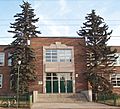Gifted education facts for kids
Gifted education (also known as GATE or TAG programs) is a special way of teaching students who are really good at certain things. These students are often called "gifted." Not everyone agrees on exactly what "gifted" means.
Contents
What Does "Gifted" Mean?
In 2011, a group called the National Association for Gifted Children shared their idea of what "gifted" means. They said "gifted" describes people who show amazing skill or talent in one or more areas. For example, a student might be gifted in music but not in math. Another student might be great at languages but not sports.
Understanding Aptitude and Competence
When we talk about being gifted, two important words are "aptitude" and "competence."
- Aptitude means having a special ability to learn or think really well. It's like having a natural talent for something.
- Competence means you've shown you can do something really well. This usually means you perform better than 90% of other people your age.
How Gifted Programs Work
There are two main ways schools help gifted students: enrichment and acceleration.
Enrichment Programs
Enrichment programs give students extra, interesting material to learn. They still move through the main school lessons at the same speed as their classmates. For example, if gifted students finish their regular math work early, an enrichment program might give them fun, challenging math puzzles or projects. This helps them learn more deeply about a subject.
Acceleration Programs
Acceleration programs help students move through school lessons faster than usual. This can happen in many ways.
- Sometimes, a student might skip a grade.
- Other times, they might take high school classes while still in middle school.
- Some students might take college-level courses early.
The goal is to match the speed of learning to the student's abilities.
A Brief History of Gifted Education
Helping gifted students is not a new idea. It has been happening for thousands of years!
Ancient Times
Long ago, around 400 BCE, a famous Greek thinker named Plato believed in special education. He thought that very smart young men and women should get special training. In ancient China, during the Tang Dynasty (580-618 CE), children who showed amazing talents were invited to the emperor's court. There, they received special lessons.
The Renaissance Era
During the Renaissance, a time of great art and learning, talented people were also supported. Artists, architects, and writers who showed creative genius often received help from governments and wealthy individuals. This allowed them to develop their skills even further.
Images for kids
 | William L. Dawson |
 | W. E. B. Du Bois |
 | Harry Belafonte |


